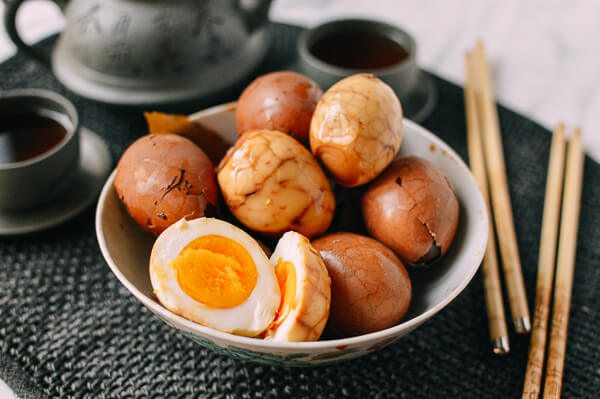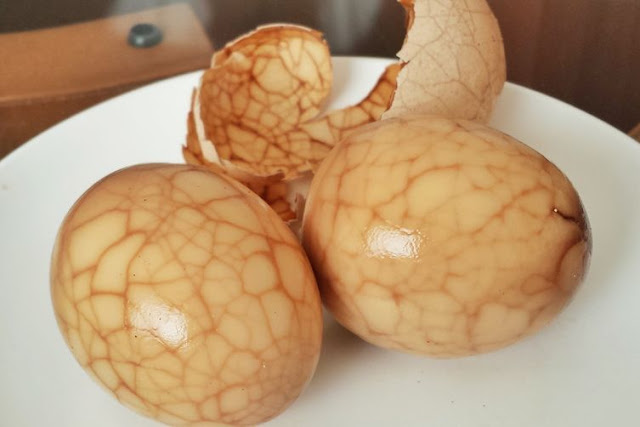Walk around many Chinese cities in the morning and you’re sure to see a crockpot or kettle full of brown liquid and discolored, slightly cracked eggs. Completely unfamiliar to the western palette, the tea egg is a surprisingly delicious savory treat prized by millions, mostly in northern China. They are also quite popular in Hong Kong and Taiwan, although the recipes vary somewhat between regions.
Check out this article for information about tea eggs and their history, and skip to the end for a special Chinese Tea Info recipe!
Overview
Although this snack gets its name from the cheap, high tannin tea leaves used in the recipe, tea is far from their only or even main flavor. In addition to tea, the recipe usually calls for a wide range of other spices and flavors, often including soy sauce, five-spice powder and sichuan peppercorns (famous for their “ma la” or “numbing spicy” flavor).
They are often eaten as a quick breakfast snack in China along with porridge, fried buns or baozi. Although they are most popular in the morning, it’s not uncommon to see them sold at night at 24 hour convenience stores and eateries.
Tea eggs being cooked in China
Tea Egg Nutritional Facts and Safety
Tea eggs are about as healthy (or unhealthy) as a regular hard boiled egg. However, because of the soy sauce in the recipe, they can be quite salty, so it’s not recommended to eat too many of them in one sitting.
Food safety is another concern for those who aren’t familiar with tea eggs. Although most recipes call for them to be left to sit for up to several days, often at seemingly unsafe temperatures, the salt and spice content of the tea liquid has something of a preserving effect, which makes them quite safe to eat.
Tea Egg Recipe!
Here is a quick and easy recipe for making tea eggs in your own home. These are perfect for a quick snack, a simple breakfast or as a conversation starting party appetizer!
You will need the following ingredients:
6-10 Eggs
1 Teaspoon salt
3 Cups of water
4 Tablespoons soy sauce
2 Tablespoons black tea leaves (preferably something cheap and very dark. I would recommend a basic Keemun, or even some Indian black teas such as darjeeling. Loose leaf english or irish breakfast blends also work well. You can substitute 2 tea bags for this if you don’t have loose tea)
1 Tablespoon 5-spice mix
1 Teaspoon sugar
1 Teaspoon sichaun peppercorn (this can be somewhat hard to find, so if you can’t find it you can either skip this or add a pinch of cayenne)
Hard boil the eggs. Leaving the water in the pot, remove the eggs and shock them in cold water to stop the cooking process. Once cool, gently tap around each egg with the back of a spoon to create cracks in the shell. Do not peel the eggs, and try to leave the shell intact (not falling off).
Return the water to a boil, and add the remaining ingredients. Reduce to a simmer, and add the cracked eggs. Steep covered for about a half hour, then transfer to the refrigerator.
Wait for 12 hours or overnight before eating. The eggs can be kept (in the liquid) for a few days.





